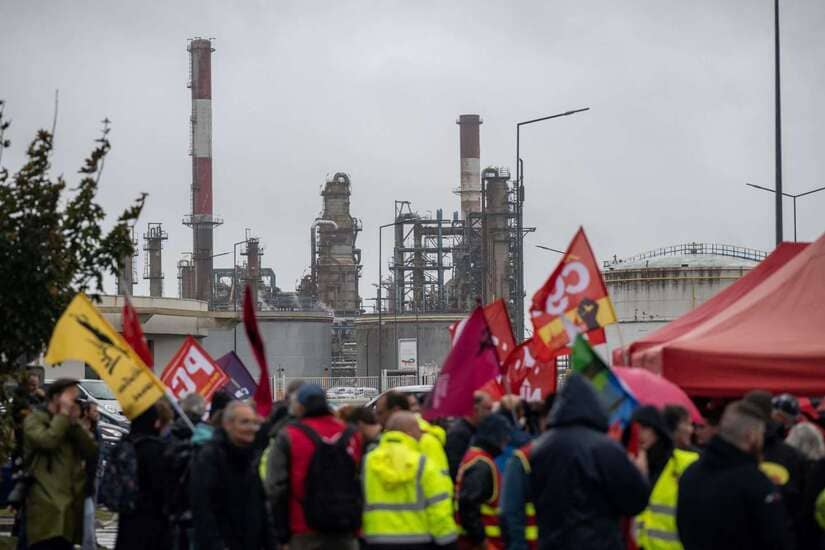Fears of a fuel shortage have been renewed in France, due to the new nationwide strike today, Tuesday (31 January), against pension reform.
As the strike led to a decrease in electricity production and the cessation of deliveries from Total Energy sites, according to information seen by the specialized energy platform, and what was published by Reuters.
The secretary of the National Union of Mines and Energy, Fabrice Cawdor, said that a new strike call for EDF and other companies in the electricity and gas industries was launched on February 6, 7 and 8.
A similar call was made for a strike at French refineries on February 6, subject to renewal.
Cessation of fuel supplies to France
On the refining side, the delivery of oil products from Total Energy sites has been banned, according to what the energy giant announced.
The UGTT coordinator for Total Energy, Eric Cellini, said that between 75 and 100 percent of workers at the company’s sites joined the strike.
The Normandy refinery includes 75% of the strikers on Tuesday, the Vysin refinery 80%, the Dong refinery 90% and the Lamed biofuel refinery 90%, while the Flanders fuel depot is 100% involved in the strike, according to the UGTT coordinator for Total Energy, Eric. Cellini.
Total explained that there is currently no shortage of fuel stations in France, as stocks in warehouses and service stations have reached a satisfactory level.
“After the strike call, shipments of products from Total Energy sites have stopped today, but the company will continue to supply the network of service stations and its customers,” the company said, according to BFM TV.
While there are currently no obstacles at sites run by Esso, the French subsidiary of Exxon Mobil, workers go to demonstrations throughout the day, according to a representative of the General Confederation of Labor.
Electricity production in France
In a related context, data from the French Electricity Company “EDF” showed that the electricity supply decreased by about 4.5%, or 3 gigawatts, as production was reduced in nuclear reactors and thermal plants.
Nuclear capacity was cut by 1.4 gigawatts among 4 reactors, and 1.6 gigawatts of heat capacity was cut at 3 plants.
The representative of the National Union of Mines and Energy, Virginie Neumayer, said that the wage negotiations had made workers in the nuclear sector and electricity production in general eager to join the strike, according to Reuters.
RTE data also showed that France is set to become a net importer of electricity from its neighbors throughout the day.
Reasons for the strike in France
Hundreds of thousands of demonstrators are expected to take to the streets of all of France on the second day of a national rally, which unions hope will be even bigger than the first.
The unions – which have scheduled protest marches across France throughout the day – want to maintain pressure on the government, and seek a repeat of the huge turnout on the first national day of protest, January 19.
On that day, some 1.12 million protesters demonstrated according to the authorities, and more than 2 million according to the General Confederation of Labor, in particular opposition to raising the legal retirement age from 62 to 64.
Opinion polls show that most French people oppose the reform, but President Emmanuel Macron and his government intend to stick to their position, given that the reform is “vital” to ensuring the continued functioning of the pension system, according to Macron.
Interior Minister Gerald Darmanin announced the mobilization of 11,000 police and gendarmerie everywhere in France, including 4,000 policemen in Paris, to secure demonstrations against pension reform.
The minister said that there are a thousand additional police and gendarmes compared to the day of the demonstrations on January 19, expressing his hope that the protests will take place “in the same conditions without serious incidents” as the previous day of mobilization.
Fuel prices in France
In this context, fuel prices in France are rapidly approaching the 2 euro mark ($2.17), continuing their rise since the beginning of this year (2023), after the end of the discounts offered by the government and Total Energy.

The average price of a liter of diesel was €1,943 ($2.11), up €0.027 ($0.029) over a week, according to the latest figures from the French Environment Ministry, which cover the period from January 21-27.
The data, which was seen by the specialized energy platform, revealed that the average price of a liter of unleaded petrol was 1,910 euros ($2.08), but after a greater weekly increase of 0.036 euros ($0.039), according to what was reported by the BFM-language satellite channel. French (BFM TV).
Since Friday, January 27 (2023), French motorists have started receiving a fuel allowance of 100 euros ($108.66), to compensate for the deductions.
The government has allocated 100 euros, a one-time aid for 2023, for citizens who use their cars to go to work, but so far only 3 million out of 10 million eligible people have applied.

Leave a Reply